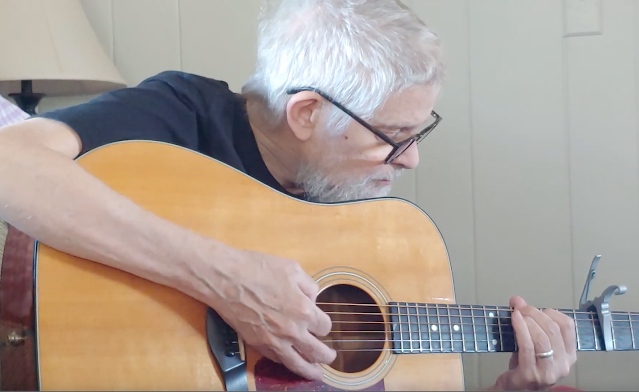In Memoriam: Amin John David Whalen. July 19, 1955 - July 31, 2022.
Don't look to me--or anyone else--for making sense of death or suffering. Despite reading a dozen or so books on Job, this ongoing revelation steeps with mystery, a holy wholly-personal transmission, respectful of each individual's indwelling Divine secret, carried by the Holy Spirit in sacred conversation, capable of building the space and time to transcend mortality.
These reflections of mine emerged somewhere in the past week, following all-night vigils, administering pain-reduction medications and softly restraining my soul brother Amin John David Whalen from trying to get free from the hospital-style bed, as his longing heightened for the further shore. In these closing days of his time in this world, as the everyday grasp of reality was slipping through our clasped hands, we meditated on bewilderment, that frustrating theme so often poignant on the path, perhaps one of the best markers of the Way.
In the final week of his sojourn here, I was keenly reminded of his sharp intellect, his delightful sense of humor, and his bridging into the mystical dimension. One night, I was reading aloud from Rumi, sometimes comparing Coleman Barks’ version in The Glance with the more literal translations of Nevit Ergin from Divan-i Kebir, Meter 3. One poem that we treasured goes:
“O friend, even the word ‘friend’
Doesn’t fit between us.
If I try to say, O Beloved,
I am unable to say ‘O Beloved.’
Even ‘Ah,’ goes back to the place
From which it comes.
I closed the road to my mouth,
I can’t wail…”
(p. 174 in Ergin; cf p. 9 in Barks)
One of the other poems we read included the term “ambergris” and I mumbled trying to recall its meaning. Amin managed to whisper “sperm whale,” somehow pulling up the knowledge that ambergris is produced in the digestive system of sperm whales. While I'd been wondering if he was attending at all to the words, he was typically (and to borrow a phrase noted by another of his life-long friends) "ahead of the curve." Amin was dedicated to creating ways to make the world more meaningful.
Another special and world-bridging moment in these final days came in the middle of a night. In one of our final attempts to use words, I managed to figure out that his frustrating attempt to articulate with his partially paralyzed tongue wanted to convey the word “code." He seemed especially pleased when I guessed Morse code, perhaps finally clueing in to his fingers tapping on my arm.
But why bring that up? I'm still open to further revelation, yet my working notion is that he wanted to convey that communication no longer need be limited to our normal ways of connecting. Perhaps our experiences over the 35 years of friendship, many of them engaging the liminal edge, often coming through our mutual love of the mythic, the mystic, poetic, the spiritual was opening to more. . . I'm reassured of continuing connection with my partner as coming to mind is Jesus comforting his friends shortly before leaving this physical plane: "and behold I am with you always."
Amin and I were often recommending readings to each other. As his medical prognosis turned more critical, I’d picked up Ghazali’s writing on The Remembrance of Death and the Afterlife and gave a copy to Amin. While neither of us completed the book, we connected on passages such as: “As for the gnostic, he remembers death constantly, because for him it is the tryst with his Beloved…” (p. 8 ). Amin also pointed us to a text found at the back of The Study Qur’an by Hamza Yusuf on “Death, Dying, and the Afterlife in the Qur’an.” It includes this:
“In the Quran, the Arabs’ denial of the resurrection of the dead is addressed and refuted in several simple yet engaging metaphors. It declares repeatedly that all things in this world have been made in pairs, of which the duality of life and death is a central one, highlighted in sundry verses. Coupled with life and death is the other essential pairing of this world (dunyā) with the Afterlife (ākhirah), a pairing whose sign, the Quran declares, should be discerned alongside Heaven and earth, both of which are commonly repeated motifs in the scripture. Given that all things in this world are created in paired opposites, it would follow that this world also has its opposite, which is the next world. Furthermore, as this world is temporal, its opposite is logically speaking eternal.”
[Hamza Yusuf, “Death, Dying, and the Afterlife in the Qur’an,” In The Study Quran: A New Translation and Commentary, Nasr, Seyyed Hossein; Dagli, Caner K.; Dakake, Maria Massi; Lumbard, Joseph E.B.; Rustom, Mohammed. (p. 1820). HarperOne. Kindle Edition.]
So much of spiritual guidance flows from the gift of Remembrance. I remember sweet moments (along with some not so sweet) in company with Mr. Whalen and our mates on the back porch, near the ocean, near Abiqui . . wherever we were. . . but especially when near natural beauty like the earth that Amin so passionately defended and proactively collaborated in order to forge more eco-friendly consciousness and action. Remembering one special time takes us back to 2016 to Chincoteague with music composed and performed by Mr. Whalen.
Another collection of wonderful memories are from a trip in 2018 to their New Mexico place near Abiqui.

Not long before their move to Ireland, John sent me a video he made called Dreaming Donegal. I'll continue trying to provide access for you to listen and view it. Meanwhile, continue remembrance. . .




No comments:
Post a Comment